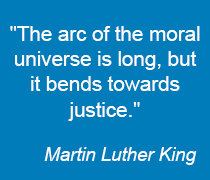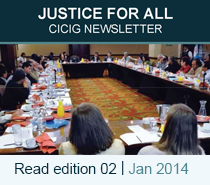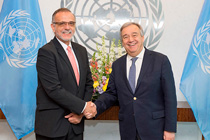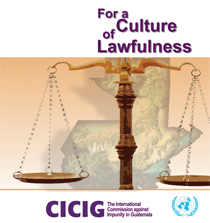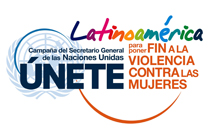|
 |
| Press Releases |
PRESS RELEASE 024
Guatemala, 13 June 2014.
PRESS RELEASE 024
Guatemala, 9 June 2014.
PRESS RELEASE 023
Guatemala, 6 June 2014.
PRESS RELEASE 022
Guatemala, 6 June 2014.
PRESS RELEASE 021
Guatemala, 5 June 2014.
|
|
 |
| Photo note |
At the forum "Young and Committed", Commissioner Iván Velásquez called upon the youth to join forces in fighting impunity.
|
|
|
PRESS RELEASE 005
CICIG’S POSITION ON THE PROCESS TO SELECT THE ATTORNEY GENERAL AND HEAD OF THE PUBLIC PROSECUTOR’S OFFICE
 Guatemala, April 15, 2010. Upon the termination of the Nomination Committee’s interviews of candidates for Attorney General of the Republic and Head of the Public Ministry, CICIG recognizes the Nomination Committee’s work to select the Attorney General and Head of the Public Ministry. Worthy of mention is the opportunity given to civil representatives and CICIG, who not only attended Committee meetings but also the public interviews of the candidates, but were granted access to information presented by the candidates. Guatemala, April 15, 2010. Upon the termination of the Nomination Committee’s interviews of candidates for Attorney General of the Republic and Head of the Public Ministry, CICIG recognizes the Nomination Committee’s work to select the Attorney General and Head of the Public Ministry. Worthy of mention is the opportunity given to civil representatives and CICIG, who not only attended Committee meetings but also the public interviews of the candidates, but were granted access to information presented by the candidates.
The public interview of the candidates-- included for the first time in the work of nomination committees-- made it possible to observe the advantages of a mechanism that offers transparency and publicizes the process. Most candidates were interviewed in-depth and with certainty. The interviews confirmed a large number of the opinions expressed by civil society and CICIG. The candidates had the opportunity to explain some of the accusations made against them. It was also possible to have better knowledge of the candidates’ work plans and to complement written information that the candidates had given with their verbal expressions and remarks.
CICIG has supported this process, witnessing all of the interviews conducted and making comments that could be useful to the Nominating Committee’s members in their reflection on and selection of the best professionals for this very high position in the country’s justice system.
CICIG wishes to emphasize some of the outcomes of the interviews:
- During the interviews, several candidates confirmed that they do not have the experience or the profile needed to become the Attorney General of Guatemala, and objectively speaking, did not demonstrate that they have knowledge or experience in criminal issues. It should be said that from the presentation of their background, it was foreseeable that several candidates would not meet the standards required to become the Attorney General according to the profile established by the Nomination Committee. The interviews confirmed the accuracy of that assessment in most cases.
- Of the group of candidates that are currently members of the Public Prosecutor’s Office, the majority do not have sufficient experience in leadership positions. Also, they did not present specific proposals to support their statements on criminal prosecution or institutional policy criteria, particularly innovative methods of criminal investigation or specific policies to “clean out” the institution. Their interventions referred mostly to generalities or a vague desire to strengthen training activities, recovering the “mysticism of work” or improving criminal investigation.
- On the other hand, some candidates certified their experience as litigating attorneys and at the same time demonstrated serious difficulties to translate this knowledge into institutional or management policies. The litigation experience is not necessarily useful when guiding institutional policies or of Public Ministry management, for which technical knowledge and/or years of experience is often necessary in the public service of the justice sector.
- Some lawyers stated that they are not linked to organized crime, yet they confirmed having at times defended officials or politicians under investigation for corruption, individuals or former officials accused of serious tax fraud, members of the military accused of human rights violations, etc. CICIG reiterates that exercising the profession and the right to a defense are constitutional and legal undisputed rights, but that habitually defending these persons is a professional decision that leads to a disconnect with a position that requires absolute adequacy and independence to prosecute different criminal acts from the point of view of protecting the rights of associates and strengthening the Rule of Law. For attorneys to use in their professional work, for example, judicially abusive strategies involving constitutional actions or judicial remedies that delay trials and prosecutions, which result in international conviction of the Guatemalan State particularly by the Inter-American Court of Human Rights, is therefore openly incompatible. A lawyer with this type of background should not be the Attorney General of Guatemala who investigates human rights violations, among other conducts, and who is in search of prompt and timely justice.
- Other candidates confirmed that, having occupied positions of responsibility in public agencies, they did not show the capacity or will to confront serious violations of the rights of persons occurring in their area of responsibility, having failed to adopt timely corrective measures against officials under their responsibility who perpetrated those violations. The Constitution assigns greater responsibility to public officials than to private citizens precisely because they act on behalf of the State.
- CICIG believes that this process brings a new opportunity for Guatemala to define the six best candidates to form the short list from which the Attorney General of Guatemala will be selected. The Nomination Committee has a difficult task ahead but the true opportunity is to determine who among the candidates best meets the standards required for the position and, most importantly, who are the candidates who best meet the ideal profile designed by the Nomination Committee to occupy one of the key positions in the Justice System. CICIG urges the Nomination Committee to complete this process in abidance with the Law and in its professional work to meet the expectations of Guatemalan citizens to build a rule of law.
|
|
|
|


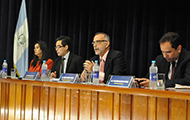
 Guatemala, April 15, 2010. Upon the termination of the Nomination Committee’s interviews of candidates for Attorney General of the Republic and Head of the Public Ministry, CICIG recognizes the Nomination Committee’s work to select the Attorney General and Head of the Public Ministry. Worthy of mention is the opportunity given to civil representatives and CICIG, who not only attended Committee meetings but also the public interviews of the candidates, but were granted access to information presented by the candidates.
Guatemala, April 15, 2010. Upon the termination of the Nomination Committee’s interviews of candidates for Attorney General of the Republic and Head of the Public Ministry, CICIG recognizes the Nomination Committee’s work to select the Attorney General and Head of the Public Ministry. Worthy of mention is the opportunity given to civil representatives and CICIG, who not only attended Committee meetings but also the public interviews of the candidates, but were granted access to information presented by the candidates.